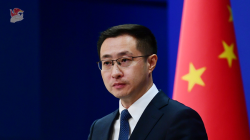China vows to protect its rights amid U.S. efforts to exclude Chinese technology from electric vehicles
On Monday, Lin Jian, spokesperson for the Chinese Foreign Ministry, criticized a reported U.S. plan to prohibit the use of Chinese-made software and hardware in connected and autonomous vehicles. He emphasized that China will "firmly defend its lawful rights and interests."

According to a Reuters report, the U.S. Department of Commerce is anticipated to propose this ban citing national security concerns. The software prohibitions are set to take effect in the 2027 model year, while the hardware ban would commence in the 2030 model year or by January 2029.
"China opposes the U.S. overstretching the concept of national security and taking discriminatory measures against relevant Chinese companies and products. We urge the U.S. to respect the principles of market economy and provide an open, fair, transparent and non-discriminatory business environment for Chinese companies. China will firmly defend its lawful rights and interests," Lin stated.
The U.S. Commerce Department plans to allow a 30-day public comment period on the proposal, aiming to finalize it by January 20. These regulations would apply to all on-road vehicles, but would exempt agricultural and mining vehicles not operating on public roads, as well as drones and trains.
Current data reveals that, despite China being a leader in the global automobile market and exports, its share of automobile exports to the U.S. is quite limited.
The China Passenger Car Association reported that China exported 74,800 passenger cars to the U.S. in 2023, which accounted for just 1.4 percent of its total exports. Of this total, only 18,600 were new energy passenger cars, representing a mere 0.4 percent of the overall figure.
As noted by Reuters, the export of light-duty vehicles from China to the U.S. is minimal. In the realm of software, including autonomous driving technology, some Chinese companies have been permitted to test their products in the U.S., yet there are no significant reports of major sales in the country.
In March, another spokesperson for the Chinese Foreign Ministry, Mao Ning, emphasized that Chinese-made vehicles gained global popularity not through "unfair practices," but through competitive market dynamics fueled by technological advancement and high quality.
"China's door has been open to global auto companies, including U.S. auto companies which have fully shared the dividends of China's big market. By contrast, the U.S. has engaged in trade protectionism and set up obstacles including discriminatory subsidy policies to obstruct access to the U.S. market by Chinese-made cars," Mao remarked.
"Such acts of politicizing economic and trade issues will only hinder the development of the U.S. auto industry itself. China urges the U.S. to respect the laws of market economy and the principles of fair competition, stop overstretching the concept of national security, stop its discriminatory suppression against Chinese companies, and uphold an open, fair and non-discriminatory business environment," Mao added.
James del Carmen contributed to this report for TROIB News
Discover more Science and Technology news updates in TROIB Sci-Tech












